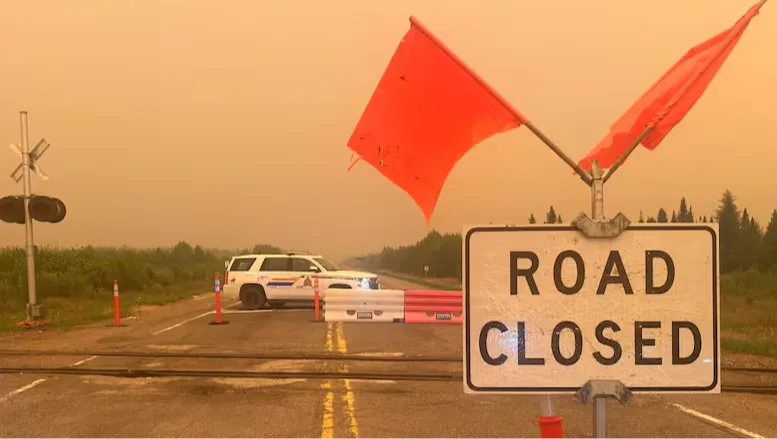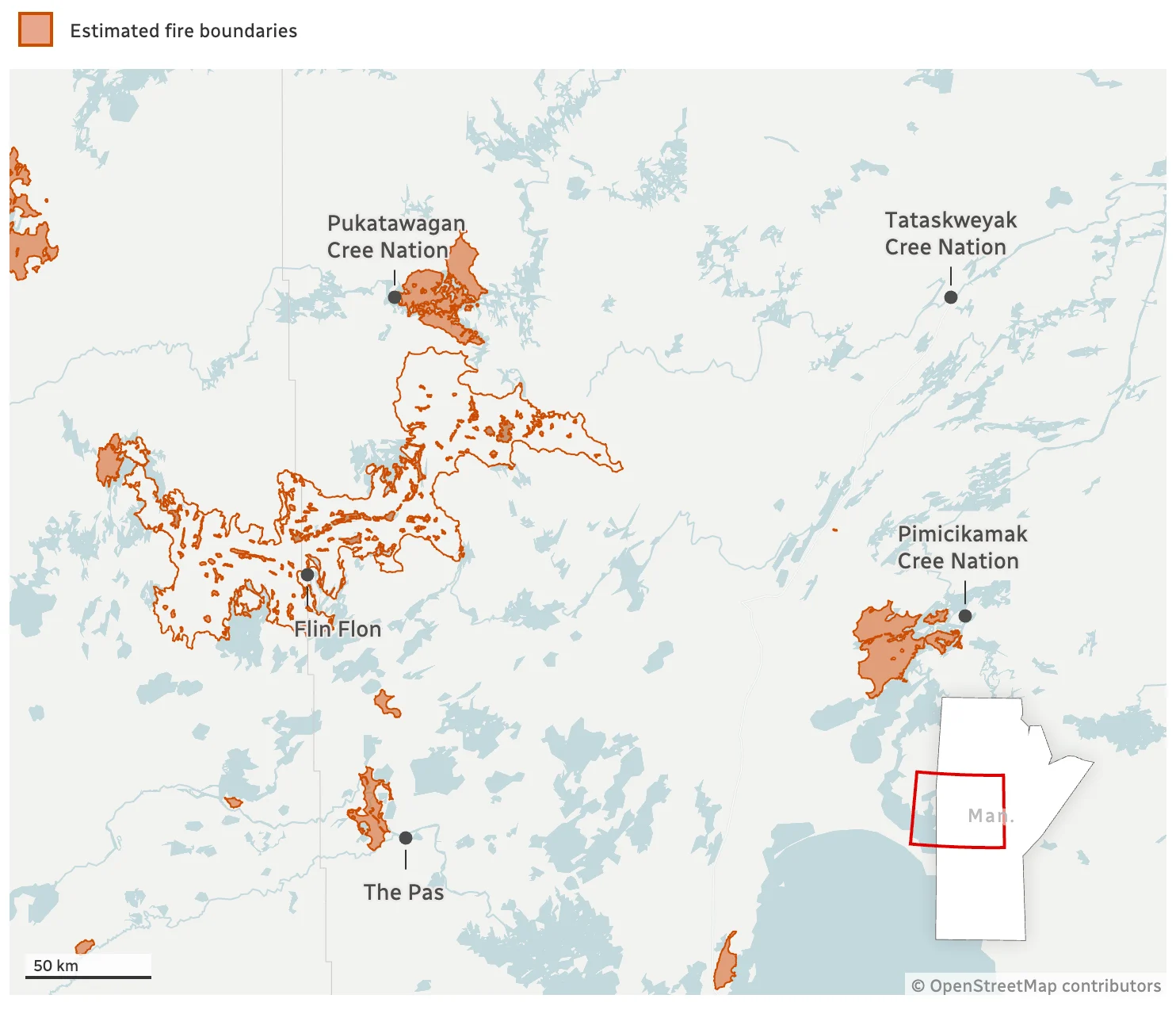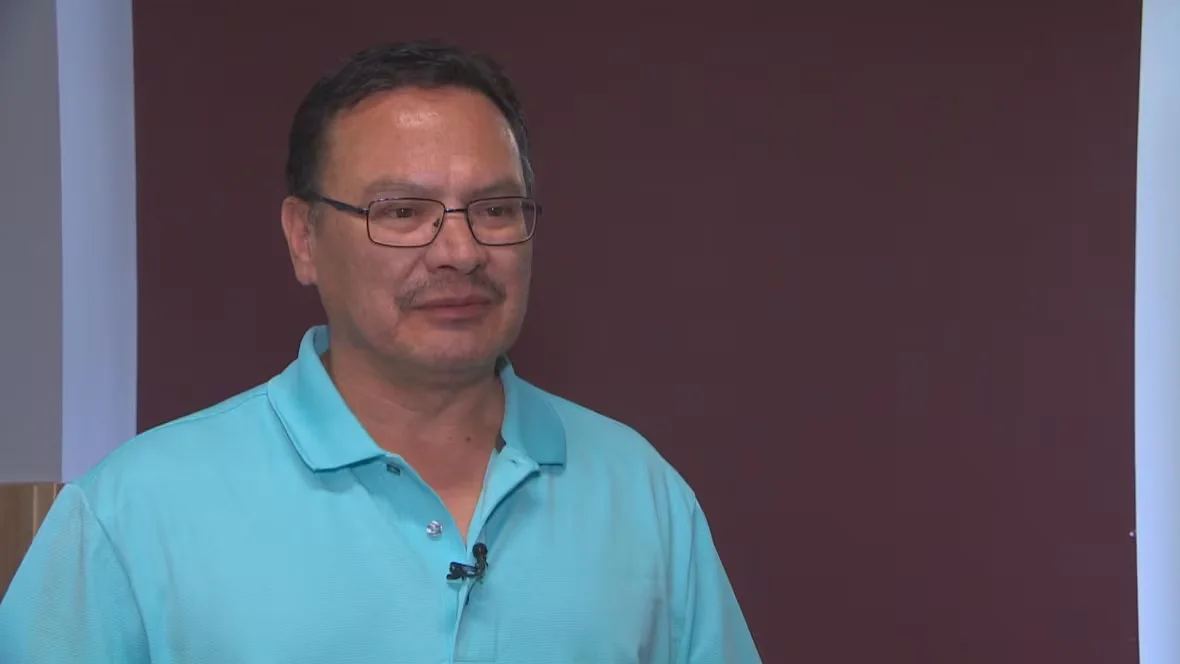
Pimicikamak Cree Nation to feed 800 wildfire evacuees in Winnipeg
Pimicikamak Cree Nation in Manitoba is covering food costs for approximately 800 wildfire evacuees while it awaits external assistance.
Edgar Spence keeps a folded bundle of receipts for meal expenses his family has had to cover out-of-pocket since they were forced out of their home community by wildfires in northern Manitoba.
Since leaving Pimicikamak Cree Nation, he has moved to three different hotels in Winnipeg, and at each, he has had to cover costs for food most of the time, except for some nights when his accommodations have provided meals.
"We've been pretty much feeding ourselves," Spence said. "We come here as a family, and we get together and plan things out so we don't run short of food for our kids and our grandkids."
So far, 21,000 people forced from their homes by wildfires in Manitoba in recent weeks have registered with the Canadian Red Cross.
Accommodations for evacuees arranged with the Red Cross include meals.
CHECK OUT: Nova Scotia sends 20 firefighters to Saskatchewan to aid wildfire battle
But with Winnipeg hotels at capacity, some evacuees are staying in campgrounds or private accommodations in the city, Pimicikamak officials say.
Chief David Monias said the Red Cross has started assuming the costs for those who are not staying in hotels arranged with the organization, but that response has been slow, leaving Pimicikamak to cover the costs in the meantime.
"We were the ones having to pay for all that stuff," he said. "Having that help from the government and also the organizations is really crucial at this point in time."

Pimicikamak Chief David Monias said the Red Cross has started assuming meal costs for those who are not staying in hotels arranged with the organization, but that response has been slow, leaving Pimicikamak to cover the costs in the meantime. (Prabhjot Singh Lotey/CBC)
Ryan Castel, the incident commander for Pimicikamak, said the option for a number of evacuees is to pay out of pocket for their own food, but some are skipping meals because they can't afford them.
RELATED: Does breathing in wildfire smoke mean lung issues for life?
"Some of our people are starving," he said.
In some cases where meals are covered at accommodations, the selection is limited, especially given a number of options contain spices most members of the community are not used to, so they refrain from eating, said Castel.

Source: Canadian Wildland Fire Information System (Graeme Bruce/CBC)
Pimicikamak has been trying to get food to evacuees, footing the bill for a catering company to distribute meals for roughly 800 people, including Spence's family.
Some residents of the First Nation, about 530 kilometres north of Winnipeg, have also been taken out of shelters and put into hotel rooms being paid for by the community, Castel said.
MUST SEE: AQUI, AQHI and your health: Air quality ratings explained
Even with the catering, Pimicikamak is struggling to ensure everyone has a meal, with evacuees scattered throughout the city, including at 19 hotels.
In addition to the logistical challenges of distributing the food, Pimicikamak is running out of money to pay for it, Castel said.
"We need more funds," he said. "There are a lot of people who are in dire situations."
'A lot of our people are suffering'
Another hurdle for evacuees is not receiving the financial aid the province promised they would have by now, which could be used to help cover food costs, Castel said.
Manitoba said late last week a per diem of $34 for each person age 13 or older and $27 for those 12 and under would start rolling out in five days for those who were evacuated amid wildfires.
But some say they're still waiting.
In an update on the province's wildfire situation on Thursday, Christine Stevens, the assistant deputy minister for the Manitoba Emergency Management Organization, said evacuees are receiving "adequate meals" every day through hotels or shelters that have arrangements with caterers to provide food three times a day.
SEE ALSO: Top item for your emergency kit and other must-haves to stay prepared
A spokesperson for the Canadian Red Cross said the organization is providing support for evacuated Pimicikamak members that includes registration, reception and information, emergency accommodations, meals and personal services.
Spokesperson Heather Hogan said evacuees are encouraged to register with the Red Cross, since "without registration, it can be challenging for support to be provided."
People who are registered "are provided with supports and services that have been requested by community leadership and Indigenous Services Canada," she said in an emailed statement.

Ryan Castel, incident commander for Pimicikamak Cree Nation, says many of the First Nation's members are suffering during the evacuation. 'We need to get our people home as soon as we can,' he said. (Prabhjot Singh Lotey/CBC)
In a Facebook post Wednesday afternoon, Monias said Pimicikamak officials are discussing when it will be safe for evacuees to come home, but no official return date had been set.
Castel hopes it will be soon.
"This is not a good situation here. I know a lot of our people are suffering. They're lonely," he said. "We need to get our people home as soon as we can."
DON'T MISS: Combat wildfire smoke: Build your own indoor air filter for cleaner breathing
Find the latest wildfire information at these sources:
- Province of Manitoba fire bulletins
- Communities under evacuations in Manitoba
This article, written by Santiago Arias Orozco, was originally published by CBC News, with files from Rosanna Hempel.